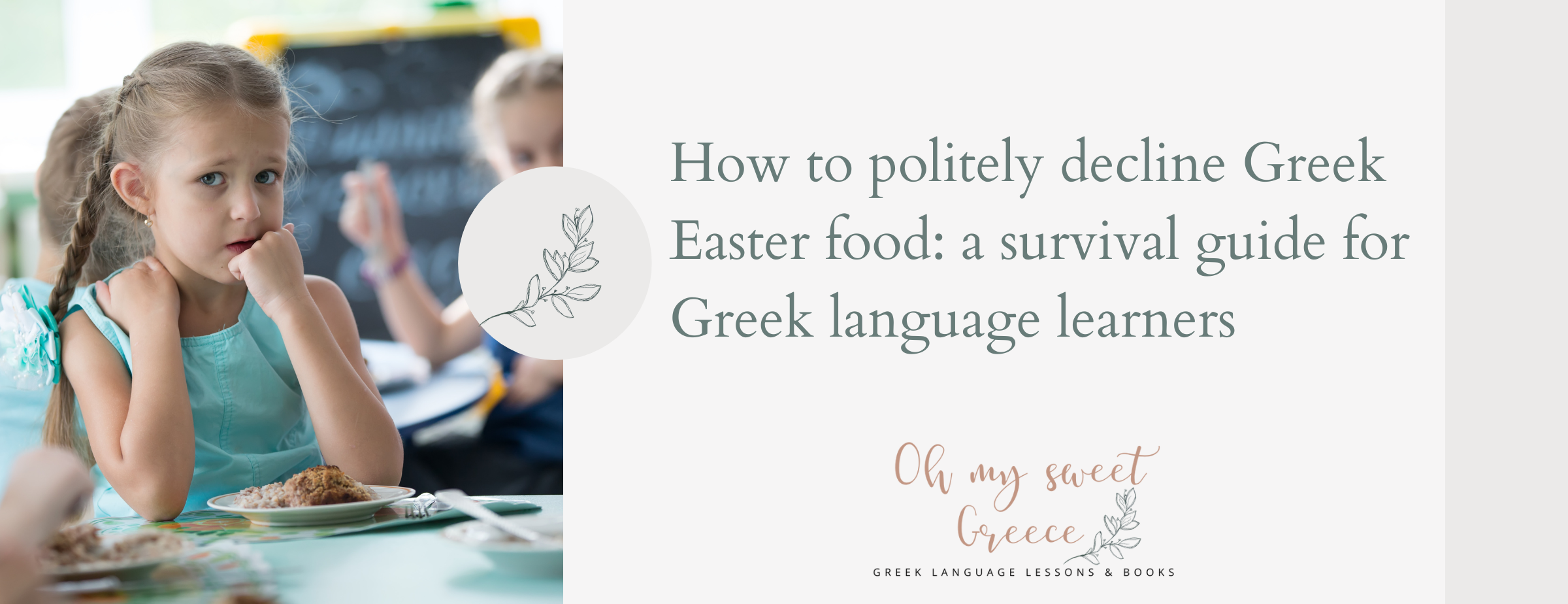
How to politely decline Greek Easter food: a guide for Greek language learners
Table of contents
Greek Easter is one of the most important celebrations in Greece, filled with traditions, gatherings, and of course, food – lots of it! While Greek Easter delicacies are beloved by many, not everyone’s palate is ready for specialties like magiritsa (offal soup) or kokoretsi (lamb intestines wrapped around offal).
[Not sure what these dishes look like? Our Instagram post breaks down all the traditional Easter foods with helpful visuals!]
If you’re learning Greek and plan to spend Easter with Greek friends or family, knowing how to politely decline certain dishes without offending your hosts is an essential cultural skill. In this guide, we’ll explore helpful phrases and cultural insights that will help you navigate the Greek Easter feast with grace and respect.
Understanding the cultural context
Before we dive into specific phrases, it’s important to understand that Greek hospitality (filoxenia) is deeply embedded in the culture. Food is not just sustenance; it’s an expression of love, care, and welcome. When Greeks offer you food, especially during important celebrations like Easter, they’re sharing something meaningful.
That said, Greeks are also understanding of personal preferences and dietary restrictions. The key is to decline politely while still showing appreciation for their hospitality.
Essential phrases for politely declining food
Express gratitude first
Always start by thanking your host:
- “Ευχαριστώ πολύ” – Thank you very much
- “Είναι πολύ ευγενικό εκ μέρους σας” – That’s very kind of you
Offer a simple reason
- “αλλά δεν τρώω κρέας” – but I do not eat meat
- “aλλά είμαι χορτοφάγος” – but I am a vegeterian
Soften the decline
- “Θα μπορούσα, όμως, να δοκιμάσω…” – Βut I could try…
- “Θα ήθελα, όμως, να φάω…” – Βut I would like to eat..
Redirect with compliments
- “Το τσουρέκι όμως είναι υπέροχο!” – But the tsoureki (sweet bread) is wonderful!
- “Τα κόκκινα αυγά είναι πανέμορφα!” – The red eggs are beautiful!
Specific scenarios and responses
When offered magiritsa (Easter soup)
- Ευχαριστώ, αλλά προτιμώ κάτι πιο ελαφρύ μετά από τη νηστεία. – Thank you, but I prefer something lighter after the fasting period.
When offered kokoretsi
- Eυχαριστώ πολύ, αλλά δεν είμαι συνηθισμένος/η σε τόσο παραδοσιακές γεύσεις. – Thank you a lot, but I’m not accustomed to such traditional flavors.
Real εxperiences from οur students
Maria, an American student at our language school, shares: “During my first Greek Easter with my boyfriend’s family, I was terrified when they offered me magiritsa. I simply said ‘Ευχαριστώ, αλλά είμαι χορτοφάγος’ (Thank you, but I’m vegetarian). They immediately understood and offered me other delicious options instead. No one was offended!”
John from Australia recalls: “I learned to always accept a tiny portion and say ‘Θα ήθελα να δοκιμάσω λίγο πρώτα’ (I’d like to try a little first). This shows respect for their cooking while giving me an escape route if I don’t enjoy it!”
Final thoughts
Remember that language learning is also cultural learning. By mastering these polite phrases, you’re not just improving your Greek language skills – you’re also demonstrating respect for Greek customs and traditions.
Greeks value honesty and authenticity, so don’t feel pressured to eat something you truly dislike. With the right phrases and a respectful attitude, you can decline foods that don’t appeal to you while still fully participating in the warm and festive atmosphere of Greek Easter celebrations.
Καλό Πάσχα! – Happy Easter!
Are you learning Greek and want more helpful cultural insights?
Join our boutique Greek language courses at Oh my sweet Greece, where we focus on practical language skills alongside authentic cultural experiences.
…and if you enjoy getting the latest posts and exclusive content delivered straight to your inbox, we’d love for you to subscribe to our newsletter!
